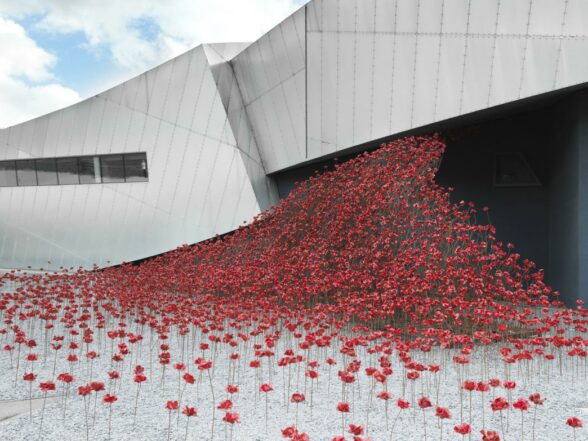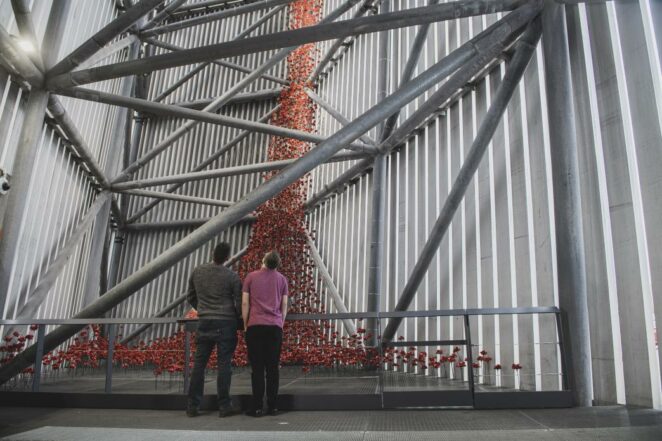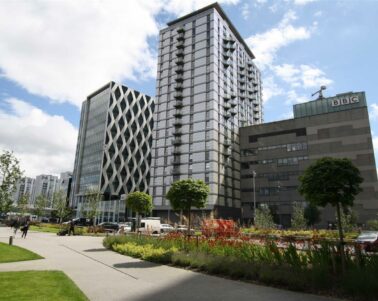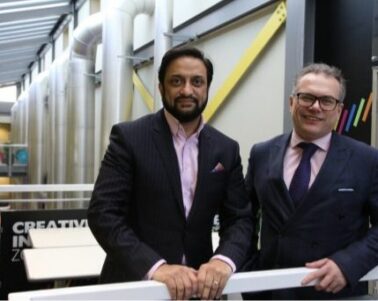
Iconic poppy sculptures make permanent homecoming to IWM North this Remembrance
Comprising of thousands of handcrafted ceramic flowers, Poppies has made its permanent home within the unique architecture of IWM North’s Air Shard. The opening of Poppies coincides with Remembrance programming across IWM’s branches, including IWM’s annual Remembrance Debate in partnership with BBC Radio 3’s Free Thinking and Breaking the Silence performances.
The iconic poppy sculptures will open to the public at IWM North on 10 November 2021, returning to Greater Manchester as part of a dramatic new artwork, titled Poppies. Comprising thousands of handcrafted ceramic flowers, Poppies has made its permanent home within the unique architecture of IWM North’s Air Shard. The opening of Poppies coincides with Remembrance programming across IWM’s branches, including IWM’s annual Remembrance Debate in partnership with BBC Radio 3’s Free Thinking and Breaking the Silence performances.

Following the success of Poppies: Wave and Weeping Window, which toured to IWM London and IWM North in 2018 to mark the end of the First World War centenary, the iconic sculptures have been combined and returned to IWM North, where they are on permanent display as part of a brand new artwork. Reimagined into a dramatic new sculptural form, Poppies is displayed within the unique architecture of IWM North’s Air Shard, opening to the public from 10 November 2021.
Poppies: Wave and Weeping Window were originally part of the installation Blood Swept Lands and Seas of Red – poppies and original concept by artist Paul Cummins and installation designed by Tom Piper – by Paul Cummins Ceramics Limited in conjunction with Historic Royal Palaces. The installation was originally at HM Tower of London from August to November 2014 where 888,246 poppies were displayed, one for every British or Colonial life lost at the Front during the First World War. Poppies: Wave and Weeping Window travelled to 19 locations around the UK between 2014 and 2018, with Wave concluding at IWM North and Weeping Window concluding at IWM London. This major four-year tour encouraged millions of people across the country to reflect on their own links to the First World War as a shared experience. The sculptures now form part of IWM’s collection and, in their new permanent home, visitors to Manchester are invited to reconnect with the poppies as both a contemporary artwork and as a means by which to reflect on the way war shapes lives. Poppies were a familiar sight on the battlefields of the Western Front, where they flourished in the devastated landscape. Since John McCrae’s 1915 poem In Flanders Fields, which concluded with the lines ‘We shall not sleep, though poppies grow / In Flanders fields,’ the poppy has endured as a symbol of remembrance. Poppies, which cascades 30 metres down and pools within the Air Shard, will help visitors to refresh their understanding of the poppy as a symbol of the very human cost of war.

Laura Clouting, Senior Curator of First World War and Early 20th Century at IWM, says: “It feels really fitting to have the poppies return and make their home at IWM North. IWM was founded over a century ago amidst the First World War to ensure that we never forget the human cost of war. This sculpture, both an artwork and a piece of social history, provides visitors with the opportunity to consider these consequences of war afresh.”
The unveiling of Poppies at IWM North coincides with Remembrance Sunday in 2021 and is accompanied by Remembrance themed programming across the museum’s branches and online. This will include IWM’s annual Remembrance Debate, in partnership with BBC Radio 3’s Free Thinking, and Breaking the Silence at IWM London and IWM North.
Related stories


Digital skills bootcamps create path into technology apprenticeships
A unique model that fast-tracks learners from Skills Bootcamps into technology apprenticeships will offer employers the most diverse, qualified and…

£13 million investment plans revealed for Lowry Outlet
Plans have been revealed for the development of Lifestyle Outlet’s Lowry Outlet MediaCityUK Manchester site following the announcement that Peel Outletshas rebranded as Lifestyle Outlets.

Entrepreneurs launch two unique innovation growth programmes at HOST
MediaCityUK based technology hub, HOST has launched two unique business incubation programmes in response to post-Covid needs by building a…